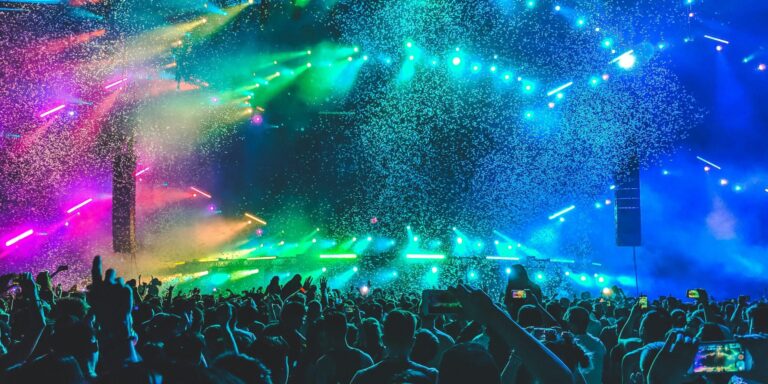Music festivals have long been a cornerstone of cultural expression, offering immersive experiences for music lovers and artists alike. However, as we enter 2025, the festival landscape is undergoing significant transformations. In an era where environmental concerns and calls for greater diversity and inclusivity are at the forefront, festivals are being forced to adapt to stay relevant and reflect the evolving values of modern audiences. Sustainability and inclusivity are no longer just buzzwords but guiding principles shaping the future of festival culture.
Sustainability has become a central focus for festival organizers. Large-scale events have historically been notorious for their environmental impact, with enormous amounts of waste generated by attendees, high carbon emissions from travel, and heavy reliance on single-use plastics. The environmental footprint of festivals has prompted increasing scrutiny, especially as global concerns about climate change and waste management grow. However, by 2025, many major festivals, including Coachella, Bonnaroo, and Glastonbury, have started to implement green initiatives designed to reduce their ecological footprint. These initiatives include banning plastic bottles, encouraging reusable cups, minimizing waste through better recycling programs, and using sustainable materials for festival infrastructure. In some cases, festivals have made significant strides toward carbon neutrality, with several aiming to achieve a net-zero carbon footprint by offsetting emissions through renewable energy sources and sustainability programs.
The shift toward sustainability in music festivals is not just about reducing waste; it’s about transforming the entire festival experience to align with modern environmental values. Some festivals now incorporate sustainability into their core branding, educating attendees about eco-friendly practices and encouraging them to participate in the green initiatives offered on-site. For instance, attendees may be asked to bring their own reusable water bottles or participate in carpooling programs to reduce transportation-related emissions. The move toward greener festivals signals a larger cultural shift in the entertainment industry, where environmental consciousness is increasingly becoming a key factor in consumer decision-making.
Alongside sustainability, there is an increasing demand for diversity and inclusivity in festival lineups and operations. Historically, many music festivals have been criticized for their lack of representation, with lineups that predominantly feature male artists and white musicians. In 2025, festival organizers are recognizing the need to reflect the cultural richness of the music world and ensure that marginalized groups—such as women, people of color, and LGBTQ+ individuals—are properly represented on stage. Many festivals are making deliberate efforts to improve gender balance and create more opportunities for underrepresented artists to showcase their talent. This push for diversity goes beyond the musical acts themselves; it extends to festival staff, with a growing focus on hiring a more diverse range of workers in key roles such as production, management, and event planning.
In addition to diversifying the talent on stage, festivals are working to create more inclusive and welcoming environments for attendees. This includes improving accessibility for people with disabilities, offering more family-friendly options, and ensuring that festival spaces are safe and supportive for individuals from all backgrounds. Many festivals are introducing initiatives to create safer spaces for women and marginalized groups, with measures such as improved security, better facilities, and more active bystander intervention programs. By 2025, it’s clear that festivals are no longer just about music; they are becoming platforms for social change and activism. Music festivals are evolving into spaces where issues such as gender equality, racial justice, and environmental sustainability are addressed not just through performances but through the very structure of the event.
This shift toward more inclusive and sustainable festivals reflects a broader cultural change in the entertainment industry. In an era where consumers are increasingly aware of the social and environmental impact of the events they support, festivals are under greater pressure to align with the values of their audiences. Today’s festival-goers are not just seeking entertainment; they are looking for events that align with their own values of sustainability, equity, and social justice. Festivals that fail to recognize this shift risk alienating their audience, while those that embrace these changes stand to build stronger, more loyal communities.
The changes in festival culture also extend to the ways festivals are marketed and consumed. With the rise of social media, festival brands have been able to cultivate more engaged and diverse fan bases by engaging directly with audiences online. Social media platforms give fans the ability to hold festivals accountable for their commitments to diversity and sustainability, as well as create new avenues for promoting underrepresented artists. The visibility of festivals has expanded globally, with events now promoting more inclusive, global lineups that celebrate a wide variety of cultures, genres, and perspectives.
In conclusion, the evolving landscape of music festivals in 2025 signals a positive shift toward more responsible, inclusive, and culturally aware events. Sustainability and inclusivity are no longer just trends—they are fundamental values that are reshaping how festivals operate and how they are perceived by their audiences. Festivals are becoming spaces where music, activism, and community intersect, offering not only entertainment but also a platform for social and environmental change. As we move forward, it will be fascinating to see how these changes continue to evolve and whether they inspire broader shifts in the entertainment industry. One thing is clear: the future of music festivals is not just about the music; it’s about creating an experience that reflects the diverse and conscious world we live in.
Source: The Guardian


